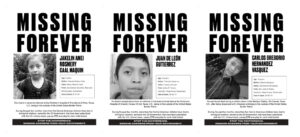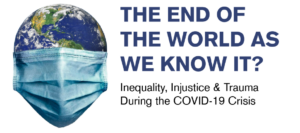Without Limits Series Explores the Many Facets of COVID-19 Pandemic
The College of Liberal Arts & Sciences’ annual series Without Limits: Interdisciplinary Conversations in the Liberal Arts explored a host of pandemic-related topics this year. This year’s program, titled, “The End of the World as We Know It? Inequality, Injustice & Trauma During the COVID-19 Crisis,” brought together panelists and guests from a variety of disciplines, including Latin American & Caribbean studies, art, creative writing, psychology, economics, political science, anthropology, black studies and languages, literatures and cultures to discuss how the pandemic has affected life both at home and abroad. Events were held virtually via Webex.
The Long Struggle to End the World As ‘We’ Know It
Latin American and Caribbean Studies Program affiliated faculty members César Barros, Adolfo Béjar Lara and Roberto Veléz-Veléz hosted the first presentation on Nov. 12, 2020, which featured renowned Guatemalan performance artist and poet Regina José Galindo. Barros, LACS program director and an associate professor of languages, literatures and cultures, moderated the panel titled “The Long Struggle to End the World As ‘We’ Know It.”
“This year the theme of the series is framed by the question, The end of the world as we know it?, and invites us to think about the current conditions under the pandemic. We felt invited to interrogate the question itself. Whose world are we talking about? And who is the we that knows in the original questions?” Barros said.
The panelists explored ideas of immigration and the ongoing political struggles occurring throughout Central and South America against the backdrop of COVID-19. The panel offered a global South perspective including presentations on Chile, Puerto Rico, Guatemala, Central America and Mexico.
Galindo shared some of her immigration-themed work in Spanish, as LACS affiliated faculty member Deyanira Rojas-Sosa provided simultaneous English translation. Galindo highlighted four projects relating to immigration and the political and humanitarian issues created between the U.S. and Central America. Of note, she discussed a piece that involved hiring a coyote and providing survival training for a group planning to immigrate into the U.S. through the Mexican border. During this 10-day performance piece, participants were taught basic safety skills such as how to navigate by the sun, how to make a fire, create shelter, climb a rock wall and connect to one another with ropes in order to ensure the group is not separated while crossing a river. Galindo, who did not condone undocumented immigration, described her purpose as providing the participants with lifesaving skills. She said caravans are both more visible and tend to attract family migrants as well as those who cannot spend the money to hire a coyote’s services to assist with their crossing. This makes border crossing potentially even more dangerous.
Galindo shared additional projects including “Missing Forever” which documented children who have died while in custody after illegally crossing the U.S./Mexican border through a series of missing posters.

Barros opened his presentation by imploring audience members to “Look South” as he discussed the issues of organized abandonment and Neoliberalism, which he defined as “a colonial, patriarchal, racist, sticky mesh that immobilizes, hurts and kills.” Barros argued that the colonial gaze allows northerners to frame their experience as “better than” in contrast to countries in Central and South America. Barros explored how these practices have impacted and influenced the Chilean uprising that began in 2019. Barros closed with the idea of incremental gains saying, “To date, people in Chile keep protesting and struggling. They have also gone in record numbers to the polls and have voted to write a new constitution through a democratic constituent assembly. This new constitution is not an arriving point nor a starting one; it is one more step in a long struggle that must persist. And so, I invite everyone to look South! If Chile was the laboratory for the contemporary form of organized abandonment, it is also, it has always been, a model of resistance and creative struggle.”
Béjar Lara, an assistant professor of languages, literatures and cultures, presented on the topic of immigration and migration; specifically, the active practice of migrant caravans through Central America that are consistently occurring in varying sizes though only the largest of these may receive news coverage. The motivation for these migrations through Central America is often an attempt to flee violence perpetrated on the basis of gender, ethnicity or economic status. In some instances, the pandemic has exacerbated these issues and increased the numbers of migrants. Migrants detained in Mexico are sent to detention centers where substandard conditions create further breeding ground for health issues, particularly amidst the pandemic.
“The migrations that we are witnessing in the middle of the COVID-19 crisis attest to the exacerbation of inequality in these countries but for these communities they also attest to the rise of xenophobia, nationalism, and anti-immigrant sentiment not only in the United States which is very evident, but also in countries like Mexico,” Béjar Lara said.
Finally, Veléz-Veléz, an associate professor of sociology, read his commentary, titled “Con Mascarillas, Pero Sin Mordazas / Wearing Face Masks, But Not Gags.” Describing the mounting debt and austerity measures that plague Puerto Rico, Veléz-Veléz explained how the multiple crises of unpayable debt, a junta, two category four hurricanes, and a number of earthquakes, among others, have made precarious access to food, housing, health, education and work. Though the stresses created by the pandemic have exacerbated existing inequalities and institutional neglect, the pandemic has not stopped people from organizing, challenging and protesting their oppression. As Veléz-Veléz conveyed in his closing, “It is the intentional, political, and collective action to upend the social structures that have held so many people down and disempowered. It is through that mobilized solidarity that people keep demanding, not asking or requesting, demanding that a dignified life is possible.”
Barros encouraged anyone interested in learning more about anthropology, history, sociology, and the global South, as well as North-South relations through immigration to investigate courses offered in the Latin American and Caribbean Studies Program.
Trauma and Coping
The second presentation, “Trauma & Coping,” took place on Mar. 2, 2021. Moderated by Isidoro Janeiro, associate professor and department chair of languages, literatures & cultures, the panel included Kristopher Jansma, assistant professor and director of creative writing, Jonathan D. Raskin, professor and department chair of psychology, and Karla Vermeulen, associate professor of psychology and deputy director of the Institute for Disaster Mental Health.
After an introduction from Janeiro, Jansma opened the panel with “Trauma and ‘The Hunger Winter’: Lessons for the 21st Century,” a presentation inspired by his weekly phone calls with his grandmother, who lived through World War II as a young girl in Holland. He described the traumatic memories relayed by his grandmother and the often-analogous experiences of his two young children living through the current pandemic. He offered his thoughts on writing as a way to process and cope with difficult times.

Vermeulen presented “Welcome to Adulthood!: Coming of Age During a Pandemic” which highlighted the impact of the pandemic on emerging adults between the ages of 18 and 29 years old. She noted common pre-pandemic stressors affecting this population included mental illness, anxiety, depression, drug use, financial issues, external threats including both natural and human-created disasters, climate change and social justice issues. Compounding these issues, COVID-19 has introduced the additional stressors of disruption of routine, social isolation, missed experiences and future uncertainty.
On a positive note, Vermeulen spoke of the possibility for resilience and post-traumatic growth. She quoted one student in her study who said: “The global impact of COVID-19 made us, human beings, feel a sense of togetherness through adversity and with hope. In the wake of the pandemic, I hope to see my generation experience post-traumatic growth. I know that we have limitless potential to form the most inclusive, unified, diverse, accepting cohort identity humankind has known – if we can come together and heal first.”
Raskin presented “The Coronavirus in Context: A Guide for Coping” which provided a framework for evaluating pandemic response and coping tools. Raskin spoke about a context centered approach to psychology and then applied it to the pandemic. Two contexts of importance include the mind and the self. The mind is focused on protection and survival while the self is focused on connections and relationships. As one example of a psychological approach to pandemic stress management, Raskin reviewed the differences between being “at effect,” a context of the Mind where you view yourself as a victim of circumstance versus being “at cause”, a context of the Self where you take charge and make the choice to care for yourself and others. He explained that it is normal to experience the former before segueing into the latter but emphasized the importance of making that transition, particularly amidst the ongoing pandemic. Appreciating the Mind and understanding its function allows for the strengthening of the Self and the passage into a more productive headspace.
“The mind wants to keep you safe . . . but it has no awareness or concern about whether you are happy. The mind wants to horde, protect, and keep you safe, without any concern about how satisfying that is. Helping people to recognize and balance those things can be particularly useful during these times,” Raskin explained.
During the Q&A, Janeiro linked the themes of the panelists’ presentations to his own work in the classroom. He teaches The Text of Memory (SPA463), which explores how individuals in society remember traumatic events such as the Spanish Civil War and the Holocaust. In relation to student inquiries regarding the post-traumatic fallout of the pandemic, Janeiro explained, “We don’t know yet what trauma is until we understand what the event is . . . It is too recent to know how the COVID lockdown is affecting everyone. It will take some time before we see some true manifestations of the effects of it.”
Upcoming Events
“COVID-19: Global Perspectives” will take place on Apr. 19, 2021, and will be moderated by Rebecca Longtin, associate professor of philosophy. Panelist will include Mona Ali, associate professor of economics, presenting “Life, Debt, and the World Dollar Order”, Yongli Li, lecturer of languages, literatures, and cultures, presenting “Whistleblowers, Little Pink, and Celebrity Scientists: China’s Social Media Culture in Pandemic Communication,” and Ş. İlgü Özler, associate professor of political science and international relations, presenting “The United Nations at 75: Passing the COVID Test?”

“COVID and Communities of Color” will take place on Apr. 28, 2021 and will be moderated by Kathleen Hunt, assistant professor of communication. The panel will include Carycruz Bueno (Brown University) and Cruz Caridad Bueno, assistant professor of black studies, presenting “Corona, the Great Exposer: Impacts on Communities of Color and Policy Implications” and Benjamin Junge, associate professor of anthropology, presenting “Race and Vaccine Attitudes among the Student Body: Discussion of Findings from a Campus Survey.”
For more information on this and previous Without Limits presentations, please visit the Without Limits website.
